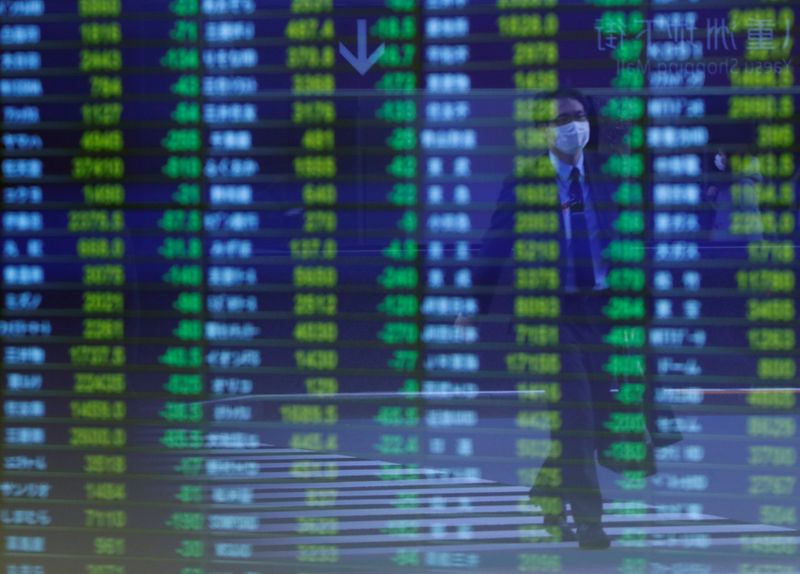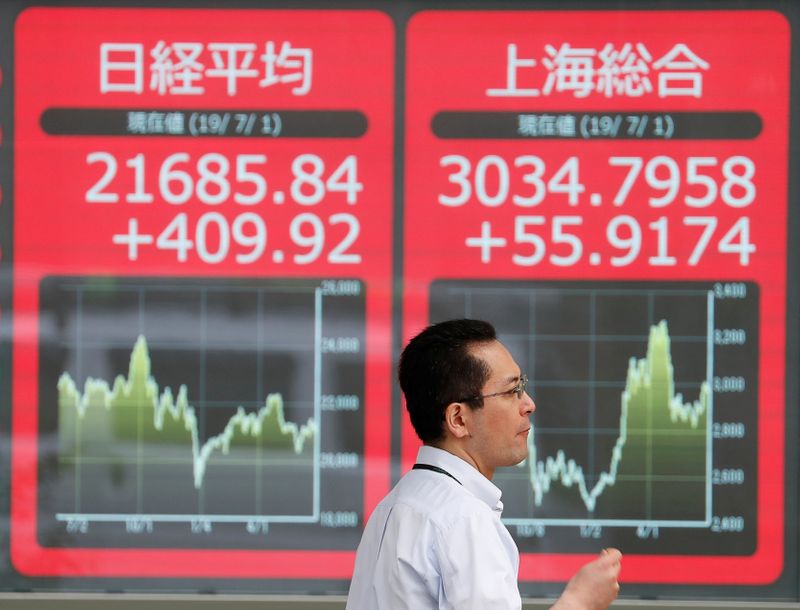By Tom Westbrook
SINGAPORE (Reuters) - Japanese stocks soared to a six-month peak and the dollar was under pressure on Thursday as investors picked positives out of recent economic data and bet on China and the United States sticking with their trade deal at a crucial weekend meeting.
MSCI's broadest index of Asia-Pacific shares outside Japan (MIAPJ0000PUS) was up 0.1%, while gains in semiconductor makers drove Japan's Nikkei (N225) 1.8% higher to a six-month peak.
The rally follows Wednesday gains in Europe and on Wall Street - which left the S&P 500 (SPX) within a whisker of a record closing high. But futures pricing suggests the latest round of optimism might lose steam in the European day.
Euro STOXX 50 futures (STXEc1) were last down 0.1%, FTSE futures (FFIc1) slipped 0.7% and S&P 500 futures (ESc1) were down 0.1%.
"People are looking at the glass half full, and testing the waters," said Bank of Singapore currency analyst Moh Siong Sim.
Throughout the week, a selloff in the U.S. bond market, as investors digest the biggest 10-year paper auction, has lifted yields enough to trigger a sharp pullback in gold as well as drop in the yen as flows come in from Japan.
At the same time, the number of daily new COVID-19 infections in the United States seems to be stabilising around 55,000 and an unexpected jump in consumer prices last month has seemed to reinforce confidence in recovery.
On Thursday U.S. 10-year yields (US10YT=RR) retraced a touch to 0.6638%, gold
But the scale and pace of stock market gains is beginning to draw a few worries. Analysts at OCBC in Singpore are concerned that a stress index they launched in April has done nothing but tumble since its inception.
"Market stress ... has subsided to such a low level that we start to wonder if we are missing anything," wrote OCBC economist Wellian Wiranto.
"With that in mind, we zoom in on the U.S.-China tensions which might start to feature more prominently," he said.
The next flashpoint is likely Saturday, when top officials meet to review the progress of the Phase 1 trade pact.
White House economic adviser Larry Kudlow said this week the deal was "fine right now," comments which helped the yuan touch a five-month high on Thursday in a sign of market confidence.
But China is lagging behind in farm goods and energy purchases and, Bloomberg News reported on Wednesday, will likely raise other areas of two countries' growing conflict during the trade talks.
DOLLAR PRESSURE
Elsewhere the upbeat mood kept broad pressure on the dollar.
Markets are still eagerly awaiting a breakthrough in wrangling over the next U.S. stimulus package. Little sign of progress is unhelpful for the U.S. economy and helped the euro (EUR=) poke back above $1.18 and sterling
The Australian dollar
Australia was also the outlier in regional equity markets, with selling of communications giant Telstra (AX:TLS) after a profit plunge dragging on the index (AXJO).
Korea's Kospi (KS11) led gains in other markets outside Japan, rising 0.7% to a two-year high.
In commodities oil mostly clung to solid gains made overnight when a drop in U.S. crude inventories spurred hopes that fuel demand is recovering.
Brent crude futures (LCOc1) were last 0.2% softer at $45.33 a barrel, while U.S. crude (CLc1) dipped by the same margin to $42.60 a barrel.

U.S. weekly jobless claims are on the horizon at 1230 GMT and investors expect a modest downtrend to continue.
